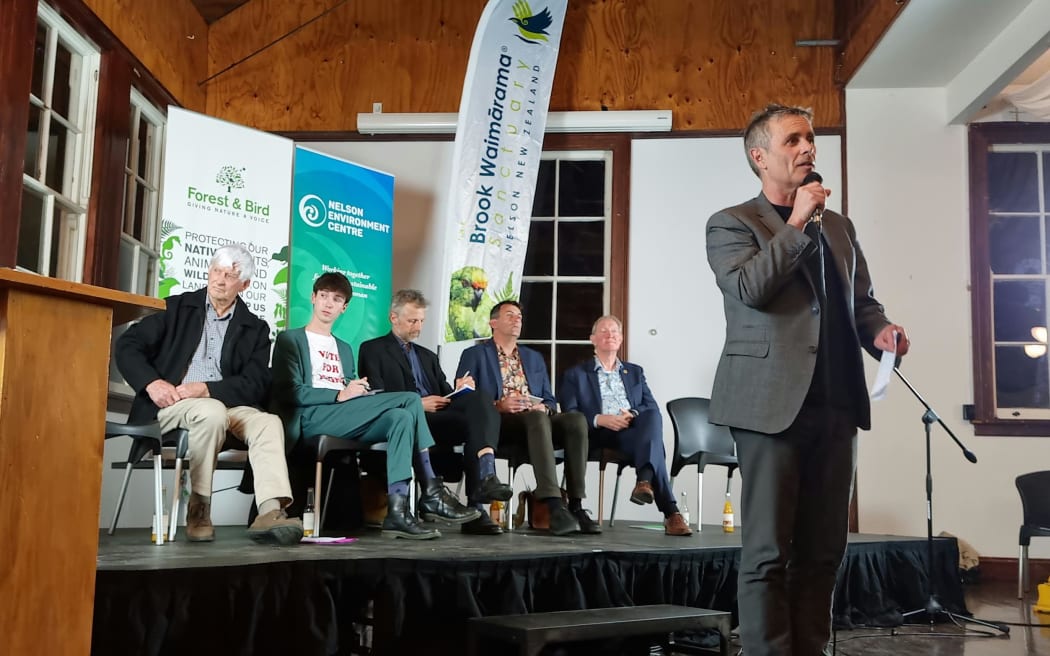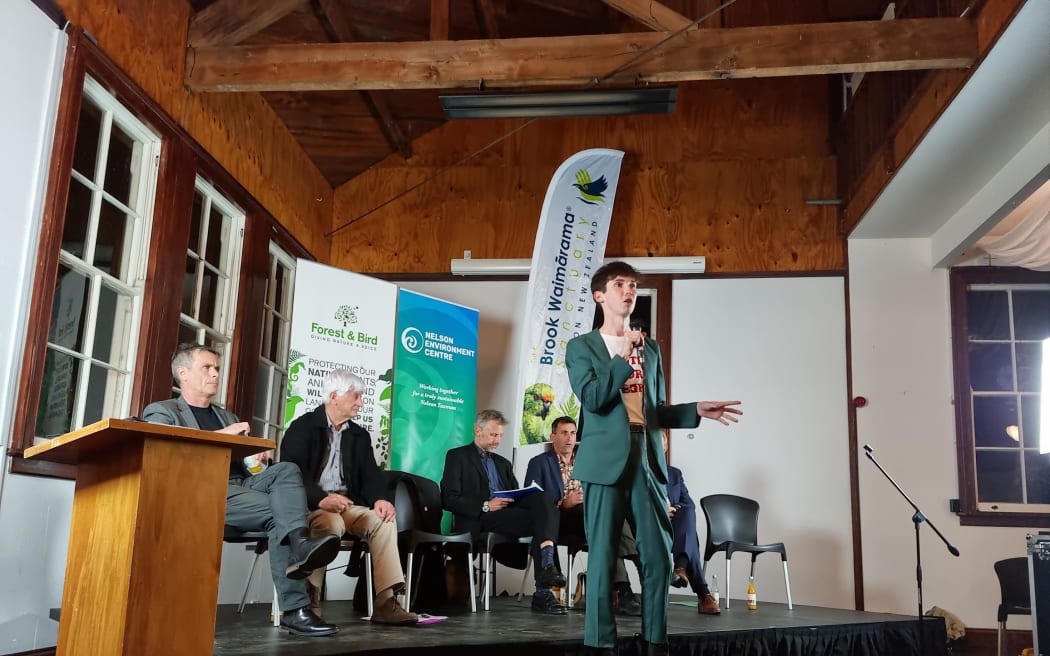
From left, Nelson mayoral candidates Kerry Neal, Rohan O'Neill-Stevens, Richard Osmaston, Tim Skinner, Nick Smith with Matt Lawrey speaking. Photo: RNZ / Samantha Gee
After severe flooding damaged hundreds of homes in Nelson last month, residents had the chance to put questions about sea level rise, climate change and their environmental concerns to those vying for the region's mayoralty.
The position is up for grabs with incumbent Rachel Reese stepping down after three terms.
A debate was held at Founders Park on Tuesday by Brook Waimārama Sanctuary, Forest and Bird, Nelson Environment Centre, and Nelson Tasman Climate Forum. The audience submitted questions with an environment focus that were put to candidates by a panel.
When asked about their priorities for future proofing against significant weather events, veteran politician and Nelson's former MP Nick Smith said the council needed a plan to mitigate the effects of climate change.
"The scale of the repairs from the August events are likely to be tens of millions of dollars and dominate the work programme for our council for the next 18 months ... and a really critical part of that work is ensuring that we build more resilient."
While there had been some good work done on climate change, "there's been too much of the bold statement and too little of the practical actions in which our council can make a difference".
Since leaving Parliament, Smith had been the project manager on New Zealand's largest wind farm at Turitea and said his passions were science, enterprise and the environment.
His top environmental priorities were to stop coal being burnt in Nelson, double the number of electric vehicle charging stations to expand the EV network and improve biking, walking and public transport options in Nelson.
A question about how council should deal with the impact of sedimentation in the marine environment sparked debate and three-term Nelson city councillor Tim Skinner said the organisation needs to up its game.
He said after the recent flooding there was half a foot of sedimentation covering Delaware Bay.
"It does concern me greatly and its something I think as a region we need to get on top of, it's not something just we as a council, it's partnering with those other landowners."
Skinner cited housing, conservation of native forests and addressing consumerism as his top environmental priorities heading into the election.
Environmental priorities
First term councillor and one of the country's youngest mayoral candidates, Rohan O'Neill-Stevens said when it came to addressing sedimentation, expanding and enhancing riparian margins was the first step.
"It also means looking at the land use that we are allowing within our catchments, like uniform clear fell forestry which is a huge contributor to sediment in all of our estuaries, these are things that we can control and there are things that we can do and we need a council and a mayor that is willing to do them."

Nelson mayoral candidate Rohan O'Neill-Stevens speaking to a public meeting, with (seated from left) Matt Lawrey, Kerry Neal, Richard Osmaston, Tim Skinner and Nick Smith. Photo: RNZ / Samantha Gee
O'Neill-Stevens said the region was facing significant challenges within the environmental space from biodiversity loss to widespread environmental degradation, or loss of water quality and a growing risk of flooding and damage from climate change and sea level rise.
"We should be proud of what we pass down to future generations and right now I think it's safe to say we can't be proud of the environment that would be handed down but that is something that we can change."
His environment priorities include de-carbonising the region's transport network, creating a compact, walkable city through urban design and intensification and resiliency planning for climate change.
On the topic of forestry, three-term city councillor Matt Lawrey said the council had a moral obligation to do the right thing for the environment.
"The number one cause of sedimentation in the Maitai River is forestry and we lose sight of that, we talk about how it's a taonga, we talk about how we are going to protect it but council is staying in the clear fell forestry game and it needs to get out of it."
Feral cats were another hot topic for Lawrey, who endorsed the mandatory desexing and micro-chipping of cats in order to protect native fauna and flora, as well as a potential limit on the number of cats per household.
His top priorities were getting Nelsonians on electric buses when they were introduced next year, creating a more compact city that meant people didn't need to rely on cars and ensuring the waterfront was built to cope with the effects of climate change.
Former Nelson City councillor Kerry Neal, reported to be the oldest mayoral candidate in the country at 84, told the audience he was the only genuine environmentalist in the room because he hadn't "polluted the side streets with placards or anything like that".
"I was a three term councillor back in the 70s and 80s when councillors were able to do things ... I've left a pile of handouts over there on the desk of a list of achievements that were that occurred back in that era, when quite seriously, councillors were hands on.
"Today, these people are handicapped, because of the rules governing local government has restricted their activity."
He said the council was still debating the Southern Link 68 years after it was first proposed which showed things hadn't progressed very far.
Neal said he had discovered that dishwashing liquid and water were effective at removing aphids from swan plants and that he was a little concerned about eels eating baby ducks in the Maitai River.
His top environmental priority was ensuring there was a plan with clear direction to address the issues the town was facing.
"When you look at the plan, clearly it's obscure to the point that you can build a library at sea level, but you've got to tell everybody else to clear out onto higher ground, how ridiculous is that."
The proposed $46m redevelopment of Nelson's library was also a hot topic, with the majority saying they didn't support the riverside location.
'Money doesn't exist'
Former airline pilot Richard Osmaston, who is running for mayor in six districts, said the system was broken and corrupt.
The debate was a chance to sell his money-free agenda, which he first promoted when he ran unsuccessfully for the region's mayoralty in 2013.
"I'm proposing that we abandon the monetary system entirely if we want to survive. There is what's called a Resource Based Economy where everything is free and everything is voluntary, that is pivotal."
His top priorities for the environment?
"Borrow as much money as you need to do the right thing, because the money doesn't exist, it's pretend.
"After that it's easy, pay for everything you need ... if the people need it, start with the people at the bottom who are really desperate and the rest takes care of itself and we will soon forget all about the money and it will just be a ghastly piece of history as we emerge from barbarity to enlightenment."
John Wakelin was the only mayoral candidate absent from the debate.
In a message read out to the crowd, John Wakelin said if elected he would "fire all those individuals who waste rates".


